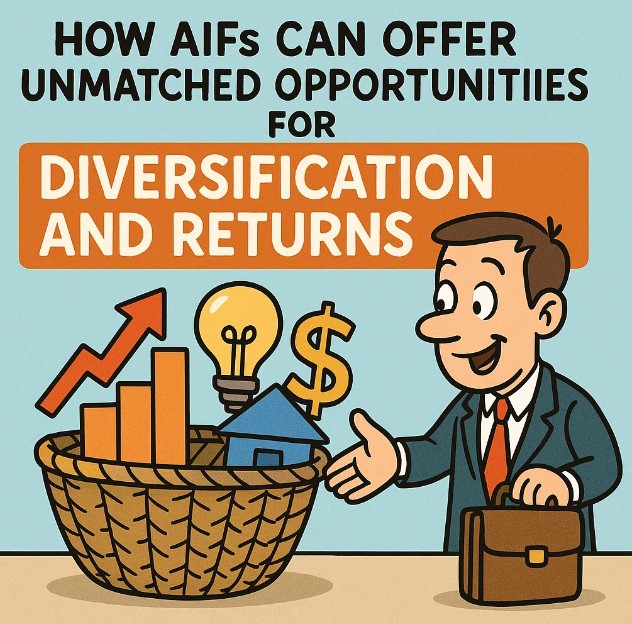
How AIFs Can Offer Unmatched Opportunities for Diversification and Returns
Wanna maximize your returns and minimize your risks? If you're seeking innovative ways to diversify your portfolio and achieve greater returns, Alternative Investment Funds (AIFs) might be the solution you’ve been looking for. AIFs are becoming increasingly popular among sophisticated investors due to their ability to provide access to unique asset classes, superior diversification, and potential for higher returns compared to traditional investments.
In a world of market unpredictability, AIFs stand out as a key strategy for investors seeking higher returns and improved portfolio stability. With access to private equity, venture capital, and alternative strategies, AIFs enable a truly diversified approach to wealth creation.
What Are AIFs?
Alternative Investment Funds (AIFs) are a category of pooled investment vehicles that invest in assets that are not typically available through traditional investments such as stocks, bonds, or mutual funds. These funds encompass a wide range of investment strategies, including private equity, hedge funds, real estate, infrastructure, commodities, and even start-up financing.
What sets AIFs apart from conventional investment vehicles is their ability to tap into markets that are often not correlated with the broader market, offering an added layer of diversification. This unique feature is what makes AIFs an attractive option for those looking to optimize their portfolio's risk-return balance.
Unmatched Diversification
In today's highly volatile financial markets, diversification is one of the best strategies to mitigate risk. AIFs allow investors to access a wide array of alternative asset classes that may not be directly correlated with traditional equity or bond markets. This unique feature provides a significant opportunity for investors to balance risk and enhance the stability of their portfolios.
- Access to Non-Correlated Assets: Many alternative assets, such as real estate, infrastructure, and private equity, behave independently of traditional stocks and bonds. This means that in times of market volatility, while stocks may be suffering, these assets could be providing stable or even positive returns.
- International Exposure: AIFs often invest in international markets, allowing investors to gain exposure to global opportunities and reducing the risk of being overly reliant on domestic economic conditions.
- Hedge Against Inflation: Certain asset classes within AIFs, like real estate and commodities, often perform well during periods of inflation, making AIFs an effective hedge against rising prices.

Potential for Higher Returns
AIFs offer the potential for significantly higher returns compared to traditional investment options. This is primarily because they invest in private markets, which often come with higher risks, but also present the opportunity for higher rewards.
- Private Equity and Venture Capital: A significant portion of AIFs is allocated to private equity and venture capital investments, where investors can participate in high-growth opportunities that are not available in public markets. Investing in start-ups or early-stage businesses can yield extraordinary returns if these companies succeed.
- Real Estate and Infrastructure: These long-term investments can offer both capital appreciation and income generation through rental yields or project completion. Additionally, real estate investments can benefit from favorable tax treatments, enhancing their return potential.
- Alternative Strategies (Hedge Funds, Commodities): Some AIFs employ hedge fund strategies that use advanced techniques like short-selling, derivatives, and leverage to generate returns, often irrespective of broader market movements. This enables skilled fund managers to take advantage of market inefficiencies and generate returns in both bull and bear markets.
Mitigating Risk with AIFs
While AIFs offer greater return potential, they are not without risk. However, due to their inherent diversification and non-correlation with traditional markets, they help mitigate some of the risks associated with conventional investments.
- Risk Management Strategies: AIFs employ sophisticated risk management strategies, such as hedging, to protect investors against market downturns. These strategies help maintain stability in a volatile market environment.
- Expert Fund Management: Most AIFs are managed by experienced fund managers who employ rigorous research and due diligence processes. Their expertise in managing alternative assets helps mitigate risks, making AIFs an appealing choice for high-net-worth investors looking for higher returns without taking on excessive risk.
The Bottom Line
AIFs offer unmatched opportunities for investors looking to diversify their portfolios, enhance returns, and manage risk effectively. By providing access to unique asset classes and alternative strategies, AIFs help investors achieve higher returns in a manner that traditional investment vehicles often cannot.
Whether you're a seasoned investor looking to tap into high-growth opportunities or someone simply seeking to reduce the risks associated with traditional investments, AIFs can provide you with a robust, diversified, and return-optimized investment strategy.
Looking for smarter ways to diversify and maximize your returns? Are AIFs the game-changer you need?
